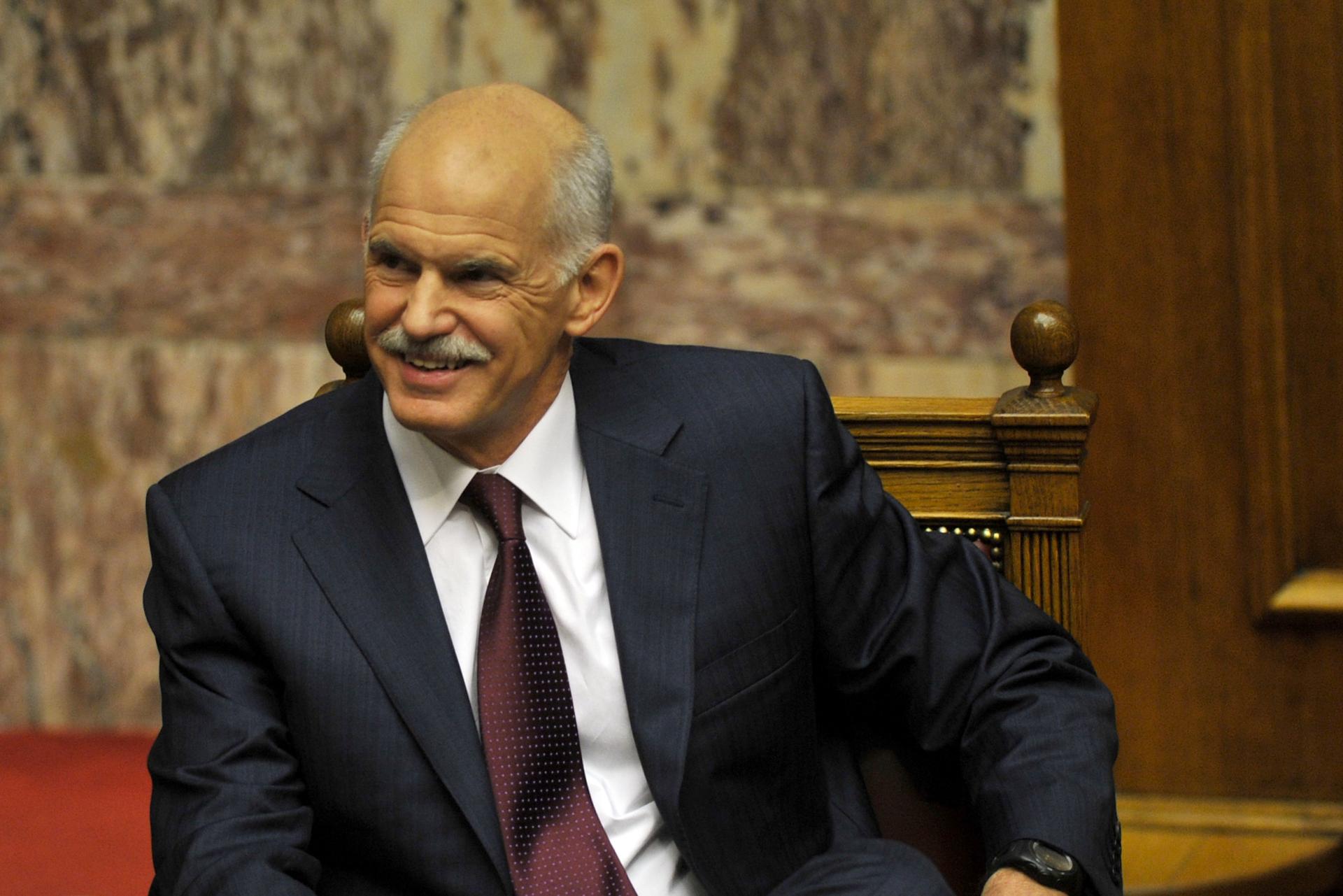Greek Prime Minister Papandreou survives critical confidence vote
Greek Prime Minister George Papandreou smiles prior to the confidence vote at the Greek Parliament in Athens on November 4, 2011.
ATHENS, Greece — With the world watching and a default looming, Prime Minister George Papandreou survived a confidence vote early Saturday by vowing to build a government that can unite Greeks and reassure creditors.
But as the sun rose, Greeks still didn’t know if Papandreou’s speech to parliament was a swan song or a prelude.
The socialist prime minister, whose family has been intertwined in Greek politics for the past century, spoke of sacrifice and strongly suggested that he’s ready to go.
“I do not care if I am not re-elected,” he said before the 153-145 vote. “I never saw politics as a profession.”
But even though he indicated he’d support new elections sometime soon, possibly early next year, Papandreou didn’t specifically say he would resign.
The PASOK party leader met later Saturday with President Karolos Papoulias to obtain permission to seek a multi-party government.
Had the vote gone the other way, Greece would have been pushed to a snap election, further jeopardizing its desperately needed bailout funds. And that would have created a default risk and fears of a global recession.
Greece will be unable to pay its creditors in mid-December unless parliament approves a bailout deal that Papandreou negotiated with Europe. The agreement would provide $180 billion in public funds and calls for a 50-percent write-off of Greek debt held by private investors.
Now the question is who will shepherd the deal through parliament before Greece goes bankrupt.
“Papandreou seems very unwilling to give up the prime ministership,” Petros Doukas, a former deputy finance minister and supporter of the main opposition New Democracy party, said Saturday.
“He’s going to start looking for coalition partners,” Doukas added. “He wants to find a formula where he stays as prime minister.”
Papandreou would love to pull his rival Antonis Samaras, head of the center-right New Democracy, into the fold because without broad support, some Greeks feel they have a moral right to evade taxes and go on strike, thus thwarting reforms.
But Samaras says no thanks, especially if Papandreou is at the helm.
“The masks have fallen. Mr. Papandreou has rejected our proposal. The only solution is elections,” Samaras, whose party leads recent polls, said in a statement Saturday.
The next scheduled national election is not until 2013.
The power struggle follows Papandreou’s bombshell announcement Monday to call a referendum on the bailout deal. He said he had no choice but to seek the public’s approval because Samaras and others had so strongly opposed the bailout and related austerity measures.
When European leaders subsequently threatened to kick Greece out of the euro zone, Samaras changed course, saying he’ll support the bailout. But he also demanded Papandreou’s resignation, saying he won’t share power with him, and called for snap elections.
Greece’s communist party, the third largest in parliament, also demands an election. Among smaller parties, the far-right LAOS, indicated it would participate in a coalition.
Whether Samaras would join a unity government without Papandreou is another question. There also was speculation Saturday that a handful of New Democracy MPs were considering cooperating with PASOK.
Another key player is Finance Minister Evangelos Venizelos, who in 2007 unsuccessfully challenged Papandreou for party leadership. Venizelos told parliament there should be an interim government until February, followed by elections.
The ambitious Venizelos broke ranks with Papandreou by opposing the referendum, but hasn’t publicly challenged his boss’ job, to lead a transitional government through the bailout vote and into an election.
“He doesn’t want something forced against Papandreou and have it ricochet against him,” Doukas said. “I think that’s not a bad strategy.”
Papandreou’s government began losing popularity almost immediately after winning just over two years ago. It uncovered a massive public debt and was forced to seek bailout funds from the European Union and the International Monetary Fund.
As a reminder of the threat of spontaneous protests and violence, police shut down two metro stations, including Syntagma Square, which faces parliament, during the confidence vote debate Saturday night.
As unlikely as it seems, Papandreou could survive to govern longer. In June, he won a confidence vote and passed unpopular austerity measures to avoid government collapse and bankruptcy.
“He was in a very similar position. He was down, then all of a sudden he came up as a winner,” Vassilis Monastiriotis, senior lecturer on southeastern European politics at the London School of Economics, said Friday before the vote.
“But I don’t think he expects he’ll be around in 2012,” Monastiriotis added. “He doesn’t have enough support from his parliamentary group.”
